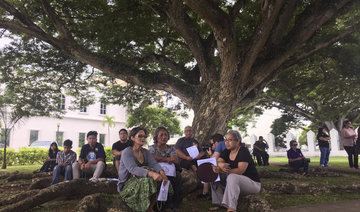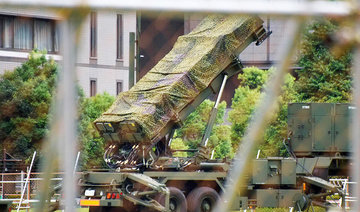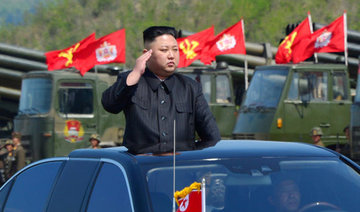HAGATNA, GUAM: Guam’s leader said Monday that “sometimes a bully can only be stopped with a punch in the nose,” in a spirited defense of President Donald Trump’s rhetoric against North Korea which has the island in its crosshairs.
While Trump’s critics accuse him of inflaming tensions with Pyongyang, Guam governor Eddie Calvo said he was grateful the US leader was taking a strong stance against North Korean threats to his Pacific homeland.
“Everyone who grew up in the schoolyard in elementary school, we understand a bully,” Calvo told AFP.
“(North Korean leader) Kim Jong-Un is a bully with some very strong weapons... a bully has to be countered very strongly.”
Calvo, a Republican, said Trump was being unfairly criticized over his handling of the North Korea crisis, which escalated when Pyongyang announced plans to launch missiles toward Guam in a “crucial warning.”
He said North Korea had threatened Guam — a US territory which hosts two large military bases and is home to more than 6,000 military personnel — at least three times since 2013.
Trump has responded by threatening “fire and fury,” warning last week that the US military was “locked and loaded” to respond to any aggression.
“President Trump is not your conventional elected leader, what he says and how he says it is a lot different from what was said by previous presidents,” Calvo said.
But he pointed out previous presidents had also used strong words to warn off Pyongyang, including Barack Obama who said last year that “we could, obviously, destroy North Korea with our arsenals.”
“One president (Obama) said it one way, cool and calmly with a period... the other said fire and fury with an exclamation point, but it still leads to the same message,” Calvo said.
He rejected suggestions that Trump and the North Korean dictator were as bad as each other when it came to the sabre-rattling playing out in the western Pacific.
“Well there’s only one guy that has vaporized into a red mist his uncle or a general because he fell asleep in a meeting with an anti-aircraft gun, that’s Kim Jong-Un,” he said.
“There’s only one guy that’s killed his brother with one of the most toxic nerve agents ever created, that’s Kim Jong-Un.”
Some regional players such as China have urged Trump to tone down his rhetoric but Calvo called on them to do more to contain Pyongyang, saying “no one wants to see a war.”
“It’s not only in the interests of America and its allies, but also China and Russia to see this fellow does not continue in his effort toward nuclearization or longer-range missiles,” he said.
“You’re allowed to voice those opinions without going to prison, whether you’re for the military or against it, unlike North Korea,” he said. He acknowledged there were “varying opinions” among Guam’s 160,000 residents about the huge US military presence on the island but insisted the majority of inhabitants backed it.
Calvo also dismissed criticism of the US-operated THAAD weapons system, which has been deployed in Guam and is capable of destroying intermediate-range missiles in the final phase of flight.
“It’s meant not to shoot people, it’s meant to shoot at missiles that kill people,” he said.
Calvo said he did not expect the crisis would have a major impact on the island’s tourism industry, which draws more than 1.5 million tourists a year.
“Guam’s a safe place to go to. Even though all this stuff is going on in the airwaves there has been no added threat level,” he said.
“I’m welcoming all the people of the world to come visit Guam, it’s a beautiful place.”
Guam leader backs ‘punch in the nose’ for Pyongyang
Guam leader backs ‘punch in the nose’ for Pyongyang

NATO chief ‘cautiously optimistic’ for Ukraine peace breakthrough
- NATO chief Mark Rutte said Thursday that he was “cautiously optimistic” for progress toward peace in Ukraine, but that it was up to Russia to take the “necessary next steps”
“I’m still cautiously optimistic that if also the Russians are willing to play ball, and not only the Ukrainians are doing this... that you could get to some breakthroughs over the next couple of weeks,” Rutte said at a NATO meeting in Turkiye.
New militarized border zone spurs national security charges against hundreds of immigrants

SANTA FE, N.M.: Several hundred immigrants have been charged with unauthorized access to a newly designated militarized zone along the southern US border in New Mexico and western Texas since the Department of Justice introduced the new approach in late April.
President Donald Trump’s administration has transferred oversight of a strip of land along the US-Mexico border to the military while authorizing US troops to temporarily detain immigrants in the country illegally — though there’s no record of troops exercising that authority as US Customs and Border Protection conducts arrests. The designated national defense areas are overseen by US Army commands out of Fort Bliss in the El Paso area in Texas and Fort Huachuca in Arizona.
The novel national security charges against immigrants who enter through those militarized zones carry a potential sentence of 18 months in prison on top of a possible six month sentence for illegal entry. The full implications are unclear for migrants who pursue legal status through separate proceedings in federal immigration court.
The Trump administration is seeking to accelerate mass removals of immigrants in the country illegally and third-country deportations, including Venezuelans sent to an El Salvador prison amid accusations of gang affiliation. The administration has deployed thousands of troops to the border, while arrests have plunged to the lowest levels since the mid-1960s.
The federal public defender’s office in Las Cruces indicates that roughly 400 cases had been filed in criminal court there as of Tuesday as it seeks dismissal of the misdemeanor and petty misdemeanor charges for violating security regulations and entering restricted military property. Court records show that federal prosecutors in Texas — where a National Defense Area extends about 60 miles from El Paso to Fort Hancock — last week began filing the military security charges as well.
Las Cruces-based federal Magistrate Judge Gregory Wormuth is asking for input from federal prosecutors and public defense attorneys on the standard of proof for the trespassing charges “given the unprecedented nature of prosecuting such offenses in this factual context.”
Public defenders say there needs to be proof that immigrants knew of the military restrictions and acted “in defiance of that regulation for some nefarious or bad purpose.”
New Mexico-based US Attorney Ryan Ellison, appointed in April, says hundreds of “restricted area” signs have been posted in Spanish and English to warn that entry is prohibited by the Department of Defense, along New Mexico’s nearly 180-mile stretch of border.
In a court filings, Ellison has said there’s no danger of ensnaring innocent people when it comes to immigrants who avoid ports of entry to cross the border in willful violation of federal law — and now military regulations.
ACLU attorney Rebecca Sheff said basic freedoms are at risk as the government flexes its power at the border and restricts civilian access.
“The extension of military bases ... it’s a serious restriction, it’s a serious impact on families that live in the border area,” she said.
The Department of Justice has warned Wormuth against issuing an advisory opinion on legal standards for trespassing in the military area.
“The New Mexico National Defense Area is a crucial installation necessary to strengthen the authority of servicemembers to help secure our borders and safeguard the country,” Ellison said in a court briefing.
Democratic US Sen. Martin Heinrich of New Mexico expressed concern Wednesday in a letter to Defense Secretary Pete Hegseth that anyone may be stopped and detained by US Army soldiers for entering a 170-square-mile area along the border previously overseen by the Department of Interior and frequently used for recreation and livestock ranching.
Hegseth has emphasizing a hard-line approach to enforcement.
“Let me be clear: if you cross into the National Defense Area, you will be charged to the FULLEST extent of the law,” he said in a post on the social platform X.
Families of victims in South Korea plane crash file complaint against 15 officials

- Police suggested a complex incident like the Jeju Air crash would require a lengthy investigation but declined to say when they expect to wrap up their probe
SEOUL, South Korea: Families of victims of December’s devastating plane crash in South Korea have filed a complaint against 15 people including the transport minister and the airline chief who they believe are responsible for the disaster that killed all but two of the 181 people on board.
Police and government officials have already been investigating the Jeju Air crash, so the complaint is largely seen as a symbolic step calling for a swifter and more thorough probe. Many bereaved families complain of what they see as a lack of meaningful progress in efforts to determine what caused the disaster and who is responsible.
On Tuesday, 72 bereaved relatives submitted the complaint to the Jeonnam Provincial Police agency in southern South Korea, according to their lawyers and police.
The 15 people cited in the complaint include the transport minister, Jeju Air’s president and airline officials handling maintenance and safety issues, along with officials at Muan International Airport who are responsible for preventing bird strikes, air traffic control and facility management, according to a statement from a lawyers’ group supporting the relatives.
The statement said the crash was “not a simple accident but a grave public disaster caused by negligent management of risks that must be prevented.”
“Four months after the disaster, we can’t help feeling deep anger and despair over the fact that there has been little progress” in the investigation, Kim Da-hye, a bereaved family member, said in the statement.
Lawyer Lee So-Ah said Wednesday the complaint would formally require police to brief bereaved families of their investigation, though police have so far only voluntarily done so.
The Boeing 737-800 operated by Jeju Air skidded off the runaway at the Muan airport on Dec. 29 after its landing gear failed to deploy, slamming into a concrete structure and bursting into flames.
Authorities have since said they found traces of bird strike in the plane’s engines and that the plane’s two black boxes stopped recording about 4 minutes before the crash. Many analysts said the concrete structure, which housed a set of antennas called a localizer that guides aircraft during landings, should have been built with lighter materials that could break more easily upon impact.
But no exact cause of the crash has been announced and no one has been legally persecuted yet over the crash, the country’s deadliest aviation disaster since 1997.
Jeonnam Provincial Police agency officials said they’ve been investigating the accident. They suggested a complex incident like the Jeju Air crash would require a lengthy investigation but declined to say when they expect to wrap up their probe.
Ukraine peace talks: What are Kyiv and Moscow’s positions?

ISTANBUL: Delegations from Kyiv and Moscow are set to hold their first direct talks on the possibility of ending the war in Ukraine for more than three years.
Ukraine’s Volodymyr Zelensky has announced he will travel to Turkiye, while Russia’s Vladimir Putin indicated he will not attend the talks.
Despite the flurry of diplomacy and US President Donald Trump’s call for a swift end to the fighting, Moscow and Kyiv’s demands appear to be far apart.
Russia has repeatedly demanded to keep the territory in southern and eastern Ukraine that it occupies and for Kyiv to cede even more land.
Moscow in 2022 annexed four Ukrainian regions — Donetsk, Lugansk, Zaporizhzhia and Kherson — despite not having full control over them.
Russia also annexed the Crimean peninsula from Ukraine in 2014 and has held it ever since.
President Vladimir Putin last year demanded Ukraine pull its forces out of parts of those regions that its army still controls as a prerequisite to any peace settlement.
Russian Foreign Minister Sergei Lavrov has said recognition of Moscow’s ownership of these territories was “imperative” for any negotiations.
Kyiv has said it will never recognize its occupied territories, including Crimea, as Russian.
But Ukrainian President Volodymyr Zelensky has said Kyiv may be forced to try to secure their return through diplomatic means — effectively conceding that Russia could maintain control over some land in any peace deal.
Russia has also demanded that Ukraine be barred from joining the NATO military alliance and has repeatedly said it wants Zelensky removed from office.
Russia had intended to topple Zelensky when it launched its invasion in 2022, with Putin calling in a televised address for Ukraine’s generals to oust him in a coup d’etat and then open talks with Moscow.
Putin in March floated the idea of Ukraine being put under a UN-backed “temporary administration,” refreshing his call to essentially remove Zelensky.
Russian officials have throughout the war called for the “de-militarization” and “de-Nazification” of Ukraine — casting Kyiv as a neo-Nazi “regime.”
Kyiv, the West and independent experts have rejected those narratives.
Russia has also sought at times to limit the size of Ukraine’s army, wants Ukraine to be declared a neutral state and for Western countries to stop supplying it weapons.
Zelensky has for months been calling for “security guarantees” for Ukraine to stop Russia invading again.
His top demand would be for Ukraine to be admitted to NATO, or for Ukraine to fall under the military alliance’s Article Five collective defense term.
Trump has however, dismissed the possibility of Ukraine joining the bloc and Russia says NATO membership would be “unacceptable.”
Instead, Kyiv is pushing for some other form of Western military commitment that would deter Moscow.
Britain and France are leading discussions about a possible European troop deployment to enforce any ceasefire, among a group of countries dubbed the “coalition of the willing.”
But Zelensky and Kyiv still want Washington to back-up any “security guarantee.”
Moscow has said it would not accept troops from NATO countries being deployed to Ukraine in any capacity.
Zelensky wants an immediate, full and unconditional ceasefire to cover combat on air, sea and land.
He accepted a US proposal for that in March but Putin rejected it.
Putin has instead ordered two short “truces” — over Easter and to cover Russia’s May 9 Victory Day celebrations.
Air attacks dipped during the periods but Ukraine accused Moscow of violating both on hundreds of occasions.
In his late-night address from the Kremlin calling for the direct Russia-Ukraine talks, Putin said he did not “exclude” that some kind of ceasefire could be agreed between the sides.
Australia removes repeatedly vandalized James Cook statue

- ‘Don’t think if we put it back up, it wouldn’t be just damaged again,’ says mayor
MELBOURNE: The Australian city of Melbourne will not replace a damaged monument to British explorer James Cook, the mayor said, for fear it will inevitably be vandalized again.
The granite-and-bronze memorial in the southeastern Australian city has been a favorite target of vandals, who tore the monument down last year and scrawled “cook the colony” on its surface.
It was similarly defaced in 2020 with spray-painted slogans of “shame” and “destroy white supremacy.”
Stephen Jolly, mayor of Yarra City in Melbourne’s inner suburbs, said the Cook monument would not be replaced because it would just be “damaged again.”
“I’m not in favor of demolishing statues of people in the past, even problematic ones, but don’t think if we put it back up, it wouldn’t be just damaged again,” he said in a statement Wednesday.
“It would be ongoing. How can we justify that?“
Vandals poured red paint over a different statue of Cook in the lead-up to Australia Day earlier this year.
Statues of colonial figures such as Cook are frequently targeted by vandals to draw attention to the plight of Australia’s Indigenous peoples.
Cook sailed into Botany Bay in 1770 and claimed eastern Australia for Britain under the doctrine of “terra nullius” — land belonging to no one — brushing over tens of thousands of years of Indigenous history.




















